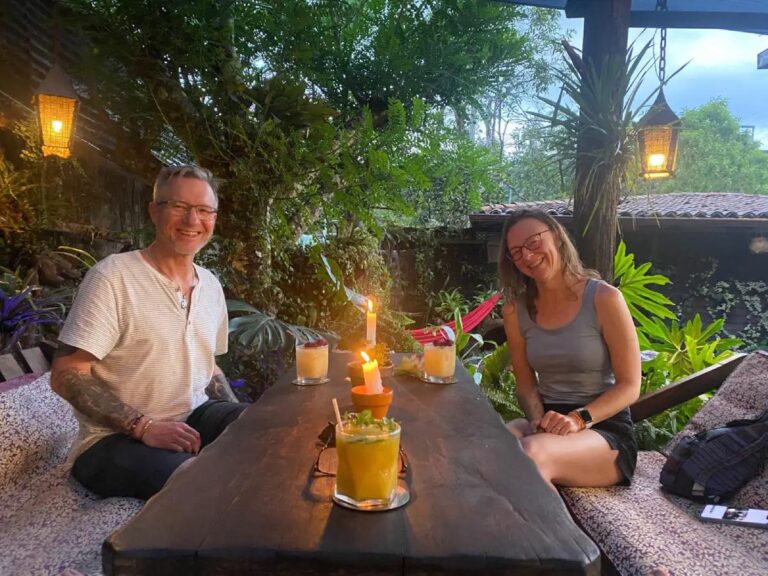TL;DR:
Housing Costs:
- Renting: Bangkok ($300-$800/month), Chiang Mai ($200-$400/month), Hua Hin/Phuket (as low as $150/month).
- Buying: Bangkok condos ($70,000+), Chiang Mai condos ($50,000+).
- Property taxes around 1% of property value annually.
Transportation Expenses:
- Public transport (Buses, BTS, MRT): 8-60 baht/trip.
- Owning a car: Costs 300,000-600,000 baht, 10,000 baht/year insurance, 3,000-5,000 baht/month fuel.
- Rental cars: 12,000-25,000 baht/month. Motorbikes: 2,500-5,000 baht/month.
- Taxis start at 35 baht/km, ride-sharing like Grab available.
Food Costs:
- Groceries: ~$200/month. Local markets are cheaper.
- Dining out: Street food ($1-$2/meal), Restaurants ($5-$10/meal).
- Budget tips: Shop at wet markets, eat street food, cook at home.
Healthcare Expenses:
- Routine care: $10-$20/doctor visit, $30-$60/specialists.
- Insurance: Basic plans ($1,200/year), Comprehensive ($3,000/year).
- Prescription drugs: <$20/month.
- Dental care: Cleaning ($30), Fillings ($40), Crowns ($300).
- Emergencies: $100-$200/ER visit.
Thinking about retiring in Thailand but worried about costs? You’re not alone. Many retirees are drawn to Thailand’s vibrant culture and affordable lifestyle. In this guide, I’ll break down the essential living expenses in Thailand—housing, transportation, food, and healthcare. By the end, you’ll know if Thailand offers the affordability and quality you need for a comfortable retirement. Curious to find out? Let’s dive in!
How Much Does Housing Cost for Retirees in Thailand?
Housing costs in Thailand are surprisingly low. You can choose to rent or buy. Both options have their own pros and cons. Renting can be cheap and easy. Owning a home in Thailand means more stability but involves higher upfront costs.
Renting vs. Owning: Pros and Cons for Retirees
Renting is a common choice. You avoid the hassles of property taxes and maintenance. You also have flexibility if you want to move. However, you can’t make major changes to the property. Renting might mean dealing with landlords who could raise the rent.
Owning a home offers more stability. You can decorate or renovate as you like. You might pay less over time compared to renting. Yet, buying a home means large initial expenses. You also have to handle property taxes and upkeep.
Average Rent Prices in Popular Cities
Bangkok is vibrant but pricey. Rent for a one-bedroom apartment can range from $300 to $800 per month. The city offers many amenities, including good healthcare and entertainment.
Chiang Mai is a favorite among retirees. It’s quieter and cheaper. Here, renting a similar apartment costs between $200 to $400 monthly. The city is known for its cooler climate and relaxed vibe.
Costs of Purchasing Property in Thailand
Buying property requires more capitalization. A condo in Bangkok can start at around $70,000. Condos in Chiang Mai might be cheaper, starting from $50,000. Still, foreign ownership is tricky. You must follow specific rules. Most retirees prefer buying condos, as land ownership is usually restricted.
What to Expect in Terms of Property Taxes and Maintenance
Property taxes in Thailand are generally low. Expect to pay about 1% of the property value per year. Besides taxes, you’ll handle maintenance costs. These can include repairs, utilities, and management fees if you own a condo.
Affordable Housing Options for Retirees
Affordable living in Thailand is very achievable. Many retirees opt for smaller cities like Hua Hin or Phuket. These places offer cheaper rent and similar amenities. Rent can be as low as $150 per month in these areas. For those on tight budgets, sharing housing with other retirees can reduce living expenses further.
Housing in Thailand offers many choices for retirees. Your lifestyle preferences will guide your decision. Whether you rent or buy, you can expect a variety of costs. Use this knowledge to plan your retirement dream wisely.
What are the transportation expenses for retirees in Thailand?
Let’s talk about getting around in Thailand. Public transportation in major cities is both cheap and efficient. You can hop on buses, trains, and the metro for just a few baht per ride. In Bangkok, the BTS Skytrain and MRT subway are convenient and cost around 15-60 baht per trip. Buses, depending on the route, cost even less, usually between 8-30 baht.
When it comes to private transportation, some retirees prefer owning a vehicle. A small car can cost you around 300,000-600,000 baht. Running a car involves fuel, insurance, and maintenance costs. On average, insurance is about 10,000 baht per year. Monthly fuel costs vary but you might spend around 3,000-5,000 baht. Maintenance doesn’t cost much, around 1,000 baht monthly if you drive regularly.
Not keen on buying? Renting a car is an option. Monthly rental rates range between 12,000-25,000 baht depending on the vehicle type. Motorbikes are also popular, with monthly rentals around 2,500-5,000 baht.
Ride-sharing and taxi services offer another affordable way to get around. Grab, a popular ride-sharing service, has simplified many retirees’ day-to-day travels. Rates are comparable to city taxis, which usually start at 35 baht for the first kilometer and then 5-10 baht for each additional kilometer. Highly affordable, taxis come in handy, especially for shorter trips.
Want to save even more? Bargain with tuk-tuk drivers or use local shared songthaews (converted pickup trucks). They cover set routes and cost less than 20 baht for short rides.
Comparing transportation costs with other countries highlights Thailand’s affordability. Public transport here is cheaper than in places like Singapore or Hong Kong. If you’re used to driving in Europe or the U.S., Thailand’s fuel and insurance costs are pleasantly lower. Even with a mix of public transport, taxis, or renting a motorbike, living in Thailand keeps your transportation expenses modest and manageable.
How much should retirees budget for food and dining in Thailand?
Retiring in Thailand can be a dream. One key aspect is food costs. Let’s dive into this topic.
Average Costs for Groceries and Local Markets
Groceries in Thailand are quite affordable. A typical retiree spends about $200 per month on groceries. Local markets offer fresh produce. You can buy fruits, vegetables, and meats at low prices. A kilogram of bananas costs about $1, while tomatoes are around $2 per kilogram.
Dining Out: Street Food vs. Restaurants
Street food is the heart of Thai cuisine. It’s delicious and cheap. For about $1-$2, you get a full meal. A bowl of noodles or a plate of fried rice will fill you up. Eating at restaurants is more expensive but still reasonable. You can expect to pay about $5-$10 per meal at a standard restaurant.
Budget-Friendly Food Options and Tips
You can save lots of money with these tips. First, shop at local markets. They are cheaper than supermarkets. Second, eat street food. It is tasty and helps your budget. Third, cook at home. Buying ingredients in bulk for home meals cuts costs.
Grocery Shopping Habits of Local Retirees
Local retirees know where to shop. They frequent wet markets for daily needs. These markets open early and close by noon. They also use retail chains for non-perishable items. Stores like Tesco Lotus and Big C are popular. These stores have a good mix of local and imported items.
Retail Chains and Supermarket Availability
Thailand has many retail chains. Tesco Lotus and Big C are the most popular. They offer a variety of goods at reasonable prices. There are also specialty stores like Makro. Makro is a bulk seller, great for stocking up. All these options make grocery shopping easy and affordable.
Answering Key Questions
How much do you need to retire comfortably in Thailand? You need about $1,500-$2,000 per month. Food costs form a small fraction of this.
How much money do you need to live well in Thailand? To live well, $1,500 per month suffices. This covers food, rent, and other living expenses.
Eating in Thailand is both affordable and diverse. Whether you prefer street food or home-cooked meals, you will enjoy delightful cuisine without breaking the bank.
What are the healthcare expenses for retirees in Thailand?
Overview of Thailand’s Healthcare System for Retirees
Thailand’s healthcare system is both modern and affordable. Many hospitals offer high-quality care. Cities like Bangkok and Chiang Mai have top-rated hospitals. Retirees can access public and private healthcare options without breaking the bank.
Cost of Routine Medical Care and Specialist Visits
Routine medical care in Thailand is cheap. A visit to a general doctor might cost around $10 to $20. Specialist visits are more, about $30 to $60. Many doctors trained abroad, so language is rarely a barrier.
Health Insurance Options and Average Costs for Expats
Health insurance is vital in Thailand. Costs for expats vary. On average, basic plans start at $1,200 per year. Comprehensive plans might be around $3,000 yearly. Insurance covers hospital stays, surgeries, and even prescriptions.
Prescription Drug Costs and Availability
Thailand offers a wide range of prescriptions. Many are cheaper than in Western countries. A month’s supply of common meds can cost under $20. Pharmacies are easy to find and well-stocked.
Dental Care: Services and Expenses
Dental care is affordable and top-notch in Thailand. A cleaning might cost about $30. Fillings are around $40. More complex procedures like crowns cost about $300. Many expats get their dental work done here.
Emergency Healthcare Services: What to Expect
Emergency services in Thailand are efficient. Most cities have ambulances that arrive quickly. Emergency room visits cost around $100 to $200. Public hospitals are cheaper than private ones but still give good care.
Healthcare for retirees in Thailand is reliable and fairly priced. From routine check-ups to emergency care, the system covers it all. Many expats are happy with the quality and cost of healthcare services.
Conclusion
Renting vs. owning a home in Thailand offers different benefits. Popular cities like Bangkok and Chiang Mai vary in rent prices. Property purchase costs include taxes and maintenance. Public transportation is affordable, with options like buses and metros. Owning or renting a vehicle depends on personal needs, and ride-sharing is cost-effective. Groceries are cheap and street food offers good value. Dining out is affordable. The healthcare system is robust, with low costs for medical care and insurance. Retiring in Thailand is affordable and offers a comfortable lifestyle. Plan your finances for a smooth transition and enjoy your new home!












